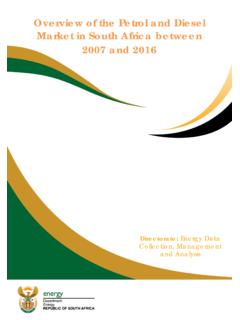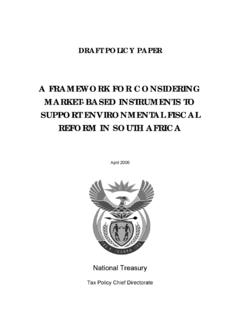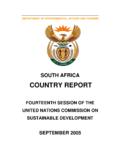Transcription of SOUTH AFRICAN - Tongaat Hulett
1 INDUSTRY INFORmATION2 SOUTH AFRICAN SUGAR INDUSTRYThe SOUTH AFRICAN sugar industry is one of the world s leading cost competitive producers of high quality sugar and makes an important contribution to employment, particularly in rural areas, to sustainable development and to the national economy. It is a diverse industry combining the agricultural activities of sugarcane cultivation with the manufacture of raw and refined sugar, syrups, specialised sugars and a range of canegrowing sector comprises approximately 35 300 registered sugarcane growers farming predominantly in KwaZulu-Natal, with a substantial investment in Mpumalanga and some farming operations in the Eastern Cape. Sugar is manufactured by six milling companies with 14 sugar mills operating in these canegrowing industry produces an estimated average of 2,2 million tons of sugar per season. About 60% of this sugar is marketed in the Southern AFRICAN Customs Union (SACU).
2 The remainder is exported to markets in Africa, Asia and the Middle CONTRIbUTION SUgAR AND THE ECONOmYThe SOUTH AFRICAN sugar industry makes an important contribution to the national economy, given its agricultural and industrial investments, foreign exchange earnings, its high employment, and its linkages with major suppliers, support industries and on revenue generated through sugar sales in the SACU region as well as world market exports, the SOUTH AFRICAN sugar industry generates an annual estimated average direct income of R8 billion. This constitutes R5,1 billion in value of sugar cane sugar industry provides direct employment in cane production and processing, and indirect employment in numerous support industries in the three provinces where sugarcane is grown and processed, namely KwaZulu-Natal, Mpumalanga and the Eastern employment within the sugar industry is approximately 77 000 jobs, which represents a significant percentage of the total agricultural workforce in SOUTH Africa.
3 Indirect employment is estimated at 350 000. In addition there are approximately 35 300 registered cane growers. Approximately one million people, more than 2% of SOUTH Africa s population, depend on the sugar industry for a living. INDUSTRY INFORmATION3 SUSTAINAbLE DEvELOPmENT AND bROAD-bASED bLACK ECONOmIC EmPOWERmENTThe sugar industry s focus on producing a high quality, profitable and cost effective product is complemented by its focus on sustainable development. The industry is a major contributor to rural development, an area often neglected in an urbanising society. This holistic approach includes the promotion of economic transformation, social investment and sustainable environmental practises. In addition to initiatives undertaken as an industry, the SOUTH AFRICAN Cane Growers Association and the sugar milling companies undertake development projects and are involved in Broad-based Black Economic Empowerment (BBBEE) through a range of important initiatives.
4 ECONOmIC TRANSFORmATIONThe industry s initiatives in the area of economic transformation could best be summarised under its commitment to Broad-based Black Economic Empowerment, with focus on land reform, agricultural support services, employment equity and enterprise ownership. Land ReformThe SOUTH AFRICAN sugar industry has long recognised the need to promote diverse ownership of agricultural land under sugarcane and have a range of support instruments in place to promote the sustainability of such initiatives. As a result, 19% of freehold land under sugarcane has already been transferred to black order to progress the industry s target of 30% black ownership of freehold sugarcane land by 2014, the industry established in 2004 an independent land reform entity, called Inkezo Land Company. Inkezo s primary objective is to streamline transfer of ownership by identifying sellers and buyers, streamlining processes of land reform and promoting the sustainability of the new ventures through outsourced support service providers or has facilitated the transfer of land previously owned by white farmers to more than 1300 black growers.
5 INDUSTRY INFORmATION4 However, the restitution of land to disposessed communities has since emerged as a fundamental determinant of the future sustainability of the sugar industry. The industry has consequently expanded its focus on land reform to deal with land restitution processes and outcomes. This expanded activity, and Inkezo, has been incorporated into the SOUTH AFRICAN Sugar industry's enlarged focus can be summarised as managing and facilitating both pre and post settlement support for land redistribution and land restitution processes. This includes focusing its activities around the following key performance areas: Dealing with both land restitution and land redistribution in the sugar sector. Supporting the processes of land redistribution and restitution, and facilitating access to resources made available by Support Services The SOUTH AFRICAN sugar industry has a long history of promoting and supporting small-scale farmers on tribal land.
6 Building on the extensive infrastructure and network of the growers and millers, the industry has been able to engage effectively in ongoing delivery related projects. Mentorship programmes focussing on business skills and grower support extension services are deployed to support cane growing activities. The SOUTH AFRICAN Cane Growers' Association also provides technical skills training for new and emerging cane growers, accounts and financial management workshops, regional economic advisors, a grower support service officer and access to a special VAT and diesel dispensation for small-scale growers. The SOUTH AFRICAN Cane Growers' Association has bolstered its regional economic service to provide local level support to new medium-scale black growers who have entered the industry since 1994, including beneficiaries of the government's land reform programme. The milling companies provide extensive services in support of the cane-growing operations of small- medium- and large-scale black farmers.
7 The SOUTH AFRICAN Sugar Association provides in-field training to small-scale growers, offers certified courses in sugarcane agriculture and provides technology transfer and extension. Employment EquityAll participants in the industry promote compliance with the Employment Equity Act, and have integrated Employment Equity and Skills Development Plans in place that are monitored and updated annually. These have targets for recruiting, developing and promoting people from designated groups. Enterprise OwnershipParticipants in the sugar industry have been actively promoting and implementing the objectives of the Broad-based Black Economic Empowerment Act, and the Broad-based Black Economic Empowerment Strategy. Substantial progress has been made towards improving the ownership profile of the industry. Initiatives embarked upon by SOUTH AFRICAN milling companies have resulted in increased black ownership of sugar manufacturing INFORmATION5 SOCIAL INvESTmENTThe sugar industry s involvement in social investment includes projects in the areas of Enterprise Development, Health and Welfare, and Human Resource DEvELOPmENT The industry is involved in numerous projects such as the provision of seed funding to assist rural black women, youth and communities to establish co-operatives and to access economic opportunities.
8 The enterprise development programmes seek to accelerate people's access to employment opportunities and increase their participation in the mainstream AND W ELFARE The staggering challenge of poverty, HIV and AIDS, unemployment and household food insecurity not only affects the quality of life of the indigent, it also threatens the social stability of these vulnerable communities. Meeting these challenges is a priority of the sugar industry. The industry works in partnership with non-governmental organisations supporting vulnerable communities in order to respond to these RESOURCE DEvELOPmENTH uman resource development is a major area of social investment for the sugar industry. The following initiatives are maintained by the industry to promote human resource development, and are primarily focussed on promoting Broad-based Black Economic Empowerment:INDUSTRY INFORmATION6 Photograph supplied by Fancy StitchEducational SupportThe Sugar Industry Trust Fund for Education (SITFE) was launched in 1965 as a private sector initiative, and is one of SOUTH Africa s oldest education and training programmes.
9 To date SITFE has provided bursaries to more than 9 000 students, financed school building projects, given assistance to tertiary institutions, and worked with community-based educational authorities to improve overall education and Engineering TrainingThe SASA Shukela Training Centre (Pty) Ltd is a wholly owned subsidiary of the SOUTH AFRICAN Sugar Industry. Shukela Training Centre (STC) is a provider of agricultural and engineering training. Based in Mount Edgecombe, with on-campus accommodation, this Institute of Occupational Excellence, so conferred by the AgriSETA, provides training in a wide selection of trades and is a registered de-centralised Trade Test Centre. In 2009 over 300 artisans qualified at STC and 27 learners qualified in the Plant Production learnership at NQF 4. Many small-scale and new farmers, including farm workers, receive sugarcane husbandry skills TransferResearch conducted by the SOUTH AFRICAN Sugarcane Research Institute (SASRI) contributes to the profitability and sustainability of the industry whilst encouraging environmentally responsible farming practices.
10 Outputs from the various research programmes at the Institute are transformed into practical knowledge and technology products. Training and development takes place through annual Certificate Courses in Sugarcane Agriculture and through a series of interventions by a network of extension Sugar Milling Research Institute (SMRI) is the central scientific organisation involved in research work and technical services for the southern AFRICAN sugar manufacturing/milling industries. It was founded in 1949 and is located on the Durban campus of the University of EducationThe SOUTH AFRICAN Sugar Association's Nutrition Department has developed a programme to communicate science-based information on the role of sugar as part of a balanced diet and healthy lifestyle to health and education professionals and the wider public. The programme contributes to capacity building and continued professional development of these professionals through support of nutrition research, congresses and nutrition ENvIRONmENTThe SOUTH AFRICAN Sugar Association promotes sound and sustainable environmental practices within the industry in line with national legislation and international requirements.






